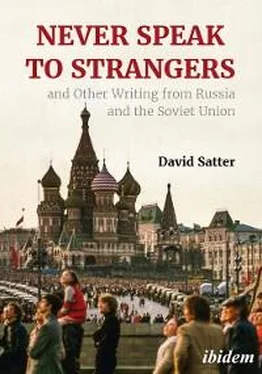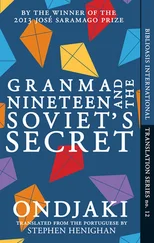In the final analysis, perhaps the most important and the most ominous aspect of Stalin’s legacy is that he chose to fall back on the Russian tradition of progress through terror and force. Stalin’s apologists, both in Russia and the West, frequently refer to the difficult conditions he faced and the tangible gains the Soviet Union achieved. These calculations fail to consider the fact that Stalin set a pattern which may claim victims for many generations to come.
Stalin’s rule left behind political passivity, because Soviet citizens came to take it for granted that all major decisions would be taken without their participation. It also left behind an abiding fear of the state machine on which the present Government freely draws.
Soviet leaders now want stability. After Stalin’s death they took a number of steps to dismantle the terror apparatus he set up. The KGB, which was a parallel system for arresting, trying, and killing those thought guilty of political crimes, was reduced to an investigative body which must turn over its information to the prosecutors and the courts. Several KGB functions were given to the Ministry of Internal Affairs, and both the KGB and Ministry were put under the control of the Party.
It is too soon to say whether these changes will forestall a new wave of terror. The Soviet form of government is a centralised, one-party system with extraordinary government powers. If opposition arises, there is a built-in tendency to eliminate it. At the same time the torpor of Russian life too often shows that a nation accustomed to being bullied can lose the ability to act on its own.
There is likely to be no honest attempt to understand Stalin in the Soviet Union. The silence may be convenient but it is far from neutral, because against the reality of state achievements it implicitly supports the notion that the interests of the state justify any human cost.
The tragedy of the Stalin era is that once again Russian leadership was cast in the mould of Peter the Great and Ivan the Terrible, reinforcing the worst aspects of the Russian state tradition at the very moment when the legatees of serfdom were seeking a new way forward.
Financial Times, Wednesday, January 23, 1980
Sakharov’s Arrest Links
Dissidence with Detente
The arrest of Dr. Andrei Sakharov 1shows that the Soviet Union is prepared to add a cynical linkage principle of its own to the East-West struggle to define the terms of detente.
Soviet authorities have stressed that Moscow has no intention of retaliating against the United States for the grain embargo or the proposal to boycott the 1980 Moscow Olympics. But the arrest and exile of Dr. Sakharov cannot be understood as anything but a direct reflection of the present conflict between the two super-powers.
The Soviet Union depicts itself as the victim of US punitive measures but, as the seizure of Dr. Sakharov shows, a decision has been taken at the highest level to strike back at the US. This will be done not through diplomatic action but through retaliation against the Soviet Union’s own citizens.
The USSR has consistently rejected any linkage between detente era agreements and Soviet military expansion in the Third World, but for several years it has tacitly agreed to the linkage between detente’s advantages and its treatment of its own people.
Dr. Sakharov, more than any other Soviet citizen, has represented opposition to totalitarianism and the desire of some Soviet citizens for democratic freedoms. There have been Press campaigns against him and he has been warned by state prosecutors that he was “abusing their patience.” But the Soviet desire for international acceptance always prevented his arrest.
In early 1977, the KGB began an unprecedentedly thorough crackdown on dissent which included the almost complete suppression of the various dissident groups which were formed to monitor the Soviet Union’s observance of the Helsinki Accords. But Dr. Sakharov remained untouched.
This was important because, by his very presence, Dr. Sakharov afforded a measure of protection to all other Soviet dissidents. They benefited from the fact that his international stature as a scientist and recipient of the highest Soviet academic honours leant status to the dissident movement as a whole.
Dr. Sakharov’s position came to symbolise the Soviet reluctance to offend the West. But now that the international situation has changed dramatically and U.S.-Soviet relations have sunk to their lowest point since the Cold War, Dr. Sakharov has been seized. He has been sent into what may be permanent exile in a city where no foreigner can reach him, and where he will be remote from his friends.
With Dr. Sakharov removed from Moscow, the Soviet authorities will have all but achieved their goal of eliminating active dissent. The past three months, which have witnessed a steady deterioration in U.S.-Soviet relations, have also been marked by over 40 arrests including those, of Tatyana Velikanova, who helped put out the “Chronicle of Current Events,” Father Dmitri Dudko and Father Gleb Yakunin, two dissenting orthodox priests, and Antanas Terleckas, a Lithuanian nationalist.
It is unlikely the authorities will stop with the latest arrests. The dissidents commanded the sympathy, if not the active support, of a significant part of the Soviet intelligentsia. With almost all of the active dissidents in prison or in exile, the Soviet authorities are free to bring greater pressure on intellectual and cultural figures or citizens who simply fail to conform.
The “decent opinion of mankind” played a vital role in Soviet internal political life, because the system does not set its own limits. In many cases it has seemed that the Soviet Union took an action specifically to provoke a Western response because it was powerless to make value judgments on its own.
Soviet acceptance of “foreign interference” in its internal affairs was made explicit last year, when Moscow bargained with Washington for two convicted spies by releasing five of its own political prisoners. It thereby confirmed the right of the U.S. to interest itself in the fate of Soviet citizens on general humanitarian grounds even if the persons involved had no connection with the U.S.
The USSR allowed Jewish emigration in 1979 to increase to 50,000 a year in an effort to gain most favoured nation trade status from the U.S.
The action against Dr. Sakharov, however, shows that the authority’s readiness to bargain Soviet internal liberty for Western concessions also has ominous connotations. If relations suffered, entire sections of the population could be held hostage.
Now, with detente faltering, Moscow has acted against Dr. Sakharov who symbolised the hope for greater freedom. Without the extra protection to others which his presence in Moscow afforded, the Kremlin will find little to restrain it if it decides to intensify repression to levels not seen in many years as the particular Soviet response to the chance pattern of foreign events.
1Dr. Sakharov was arrested in Moscow on January 22, 1980 and exiled to the Volga River city of Gorky (now Nizhnii Novgorod).
Financial Times, Friday, January 25, 1980
The progress of detente has always been based on some necessary illusions. With the invasion of Afghanistan and the exile of Dr. Andrei Sakharov, the Nobel Peace Prize winner and leader of the Soviet human rights movement, they are being dispelled all at once.
The Soviets want detente for political, economic and psychological reasons. Disarmament reduces arms expenditures and trade brings access to western goods. Cultural, technological and sporting exchanges earn the respectability which comes of co-operation with the rest of the world. But the Soviets, because of the ideological nature of their society, have no political goal—including detente—which transcends their commitment to expanding their own power. They have insisted from the beginning that Soviet military intervention in the Third World and the final say on how they treat their own people are no concern of anyone else.
Читать дальше












